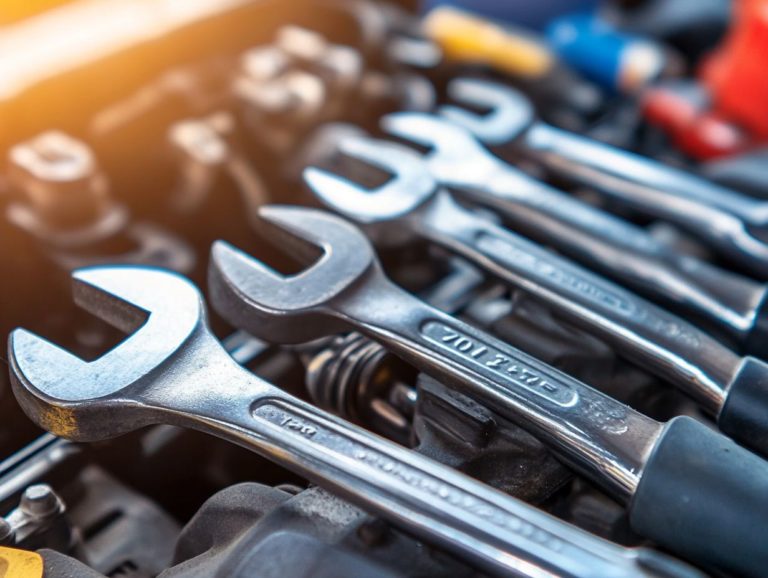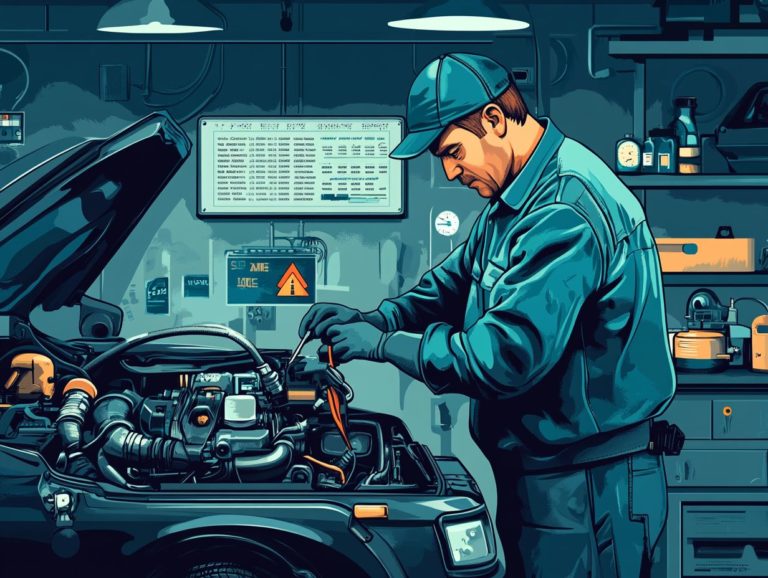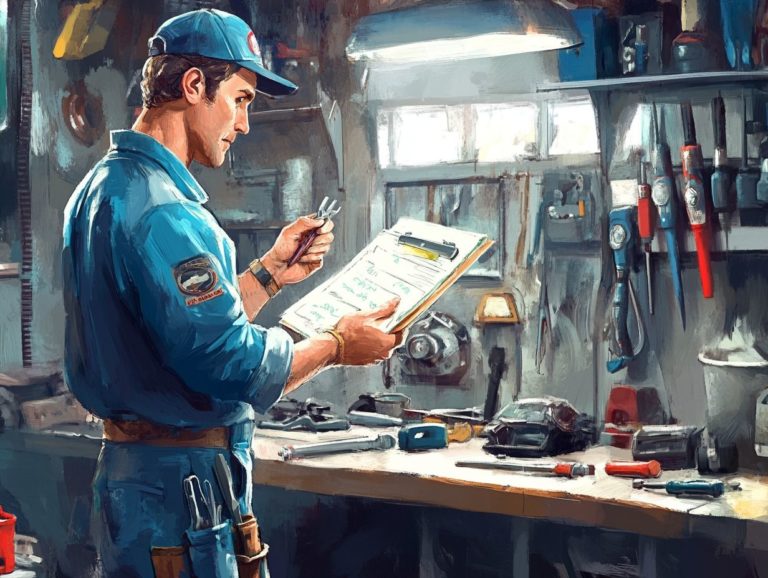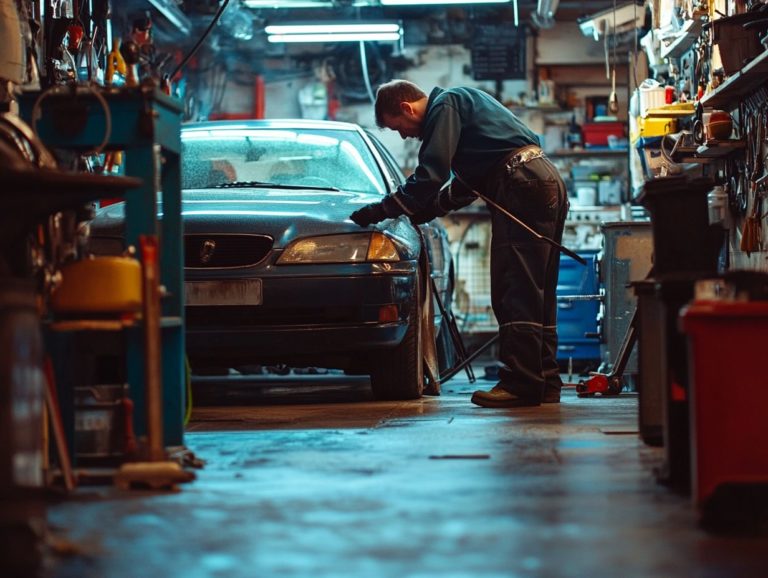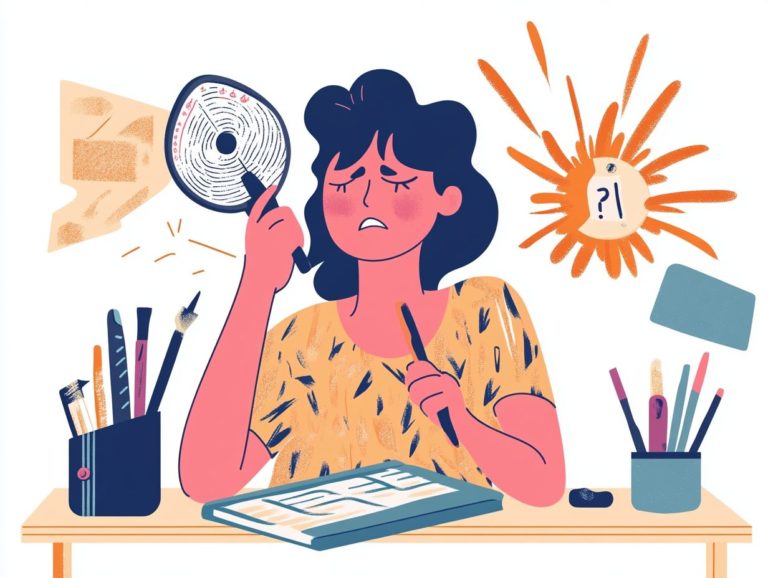Common Car Repairs: A Comprehensive Guide
Maintaining your vehicle is crucial for its longevity and optimal performance. Regular upkeep enhances safety and helps you avoid pesky, costly repairs in the future.
This guide covers key areas of car maintenance, including the engine, brakes, suspension, electrical systems, transmission, and exhaust. It highlights common issues and signs to watch for while offering practical tips to keep your car running smoothly.
Whether you re an experienced car owner or just starting your journey in vehicle maintenance, this information will empower you to keep your vehicle in peak condition.
Contents
- Key Takeaways:
- Why Regular Maintenance is Important
- Engine Repairs
- Brake and Suspension Repairs
- Electrical and Battery Repairs
- Transmission Repairs
- Exhaust and Emissions Repairs
- Preventive Maintenance Tips
- Frequently Asked Questions
- Curious about common car repairs? Here are a few!
- What is the purpose of a comprehensive car repair guide?
- Do I need to have any prior knowledge to use a comprehensive car repair guide?
- How can I prevent common car repairs?
- When should I seek professional help for car repairs?
- Are there any safety precautions I should take when performing car repairs?
Key Takeaways:
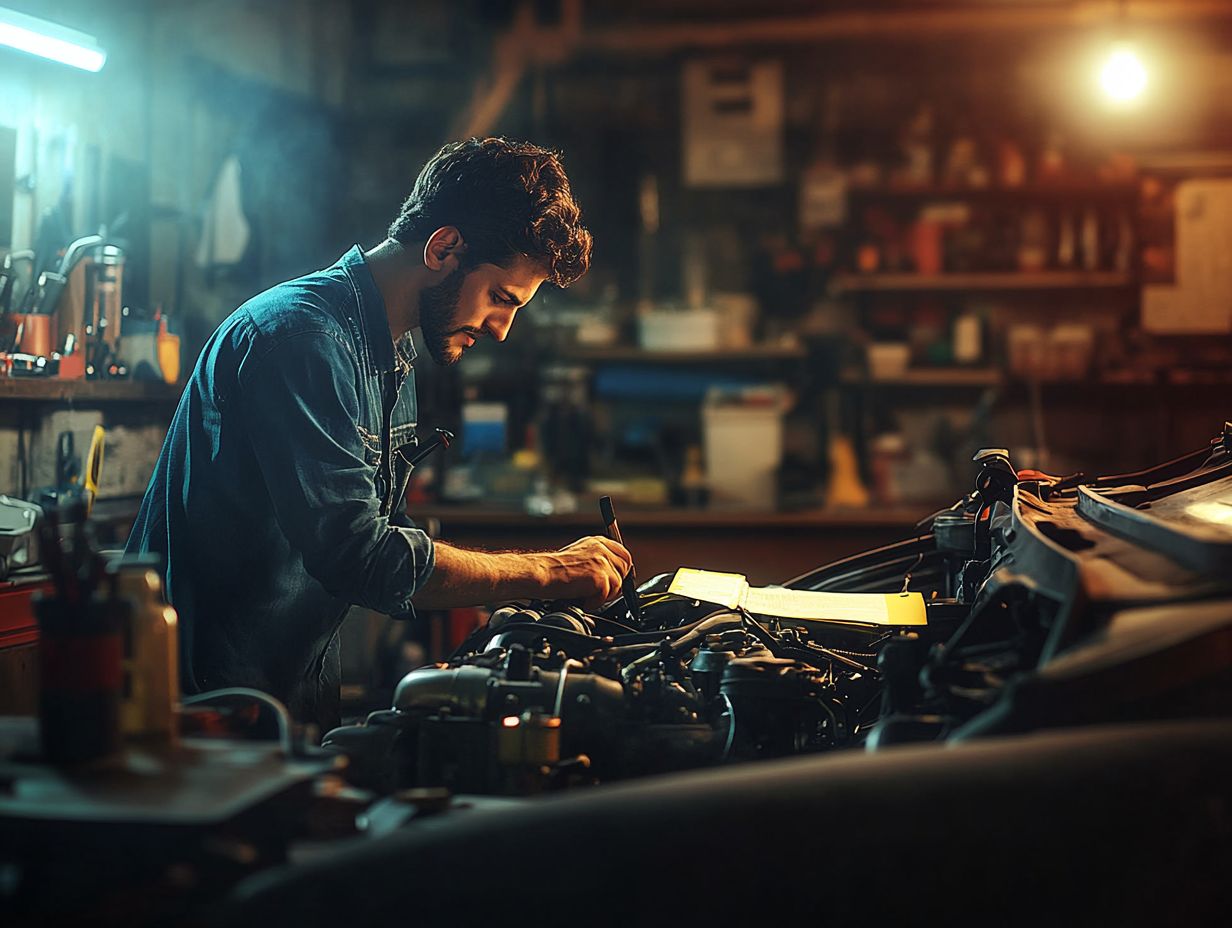
Regular maintenance keeps your car running smoothly and prevents costly repairs.
Identifying and addressing engine, brake, suspension, electrical, battery, transmission, and exhaust issues can save you time and money in the long run, especially when you learn how to manage common car repairs on a budget.
Following preventative maintenance tips, like regular oil changes and tire rotations, helps you avoid major repairs and extends your vehicle’s lifespan.
Why Regular Maintenance is Important
Keep your ride in top shape with regular maintenance it s your key to a safer, smoother drive! Regular maintenance is vital for your vehicle s longevity and peak performance, allowing you to catch potential issues before they turn into costly repairs.
In the bustling automotive landscape of Dallas-Fort Worth, you face various challenges, from fluid leaks to engine troubles. Sticking to a structured maintenance schedule is absolutely essential.
By committing to preventative maintenance, you boost fuel efficiency, extend the life of crucial components, and guarantee a safe driving experience. Certified mechanics with specialized training provide essential insights into your vehicle’s service history, ensuring that even minor concerns are tackled promptly to help you sidestep common repair pitfalls.
Engine Repairs
Engine repairs are among the most essential services provided by trustworthy auto shops. Addressing common engine issues is crucial for your vehicle’s performance and safety.
Whether it s the unsettling sound of an unusual noise or the ominous glow of the engine light, identifying these warning signs early can spare you significant damage and exorbitant repair bills.
With the aid of cutting-edge technology, ASE-certified technicians conduct comprehensive diagnostic tests to uncover the root causes of engine troubles. This approach allows them to deliver precise repair estimates and effective solutions tailored to your car s unique requirements.
Identifying and Addressing Engine Issues
Identifying and addressing engine issues is crucial for maintaining your vehicle’s functionality and safety. Ignoring even minor symptoms can lead to significant problems down the road.
If you hear unusual noises, experience decreased power, or see the engine light illuminating on your dashboard, these are all signs that deserve your immediate attention.
A thorough diagnostic test is essential. This allows ASE-certified mechanics to accurately assess your vehicle’s condition and recommend necessary repairs tailored to your needs.
Beyond these visible signs, you might notice reduced fuel efficiency or odd vibrations during operation, both of which signal underlying issues that shouldn t be overlooked. Mechanics utilize a range of diagnostic tools, like OBD-II scanners, which check your vehicle s computer for errors, to retrieve error codes that offer invaluable insights into specific problems.
Addressing engine concerns promptly is critical. By doing so, you can avoid more extensive repairs, ultimately saving both time and money in the long run.
Brake and Suspension Repairs
Brake and suspension repairs are essential for maintaining both the safety and performance of your vehicle. These systems are critical for effective handling and stopping.
Regular inspections of your brakes are vital, revealing issues like worn brake pads, low fluid levels, or unusual noises that could signal deeper problems.
By addressing repairs promptly, you sidestep common repair pitfalls, improve your vehicle s responsiveness, and ensure optimal tire pressure. These elements are key to providing a smooth driving experience and extending the life of your vehicle s components.
Don t wait! Schedule your maintenance checks today to avoid potential issues down the road.
Common Brake and Suspension Problems
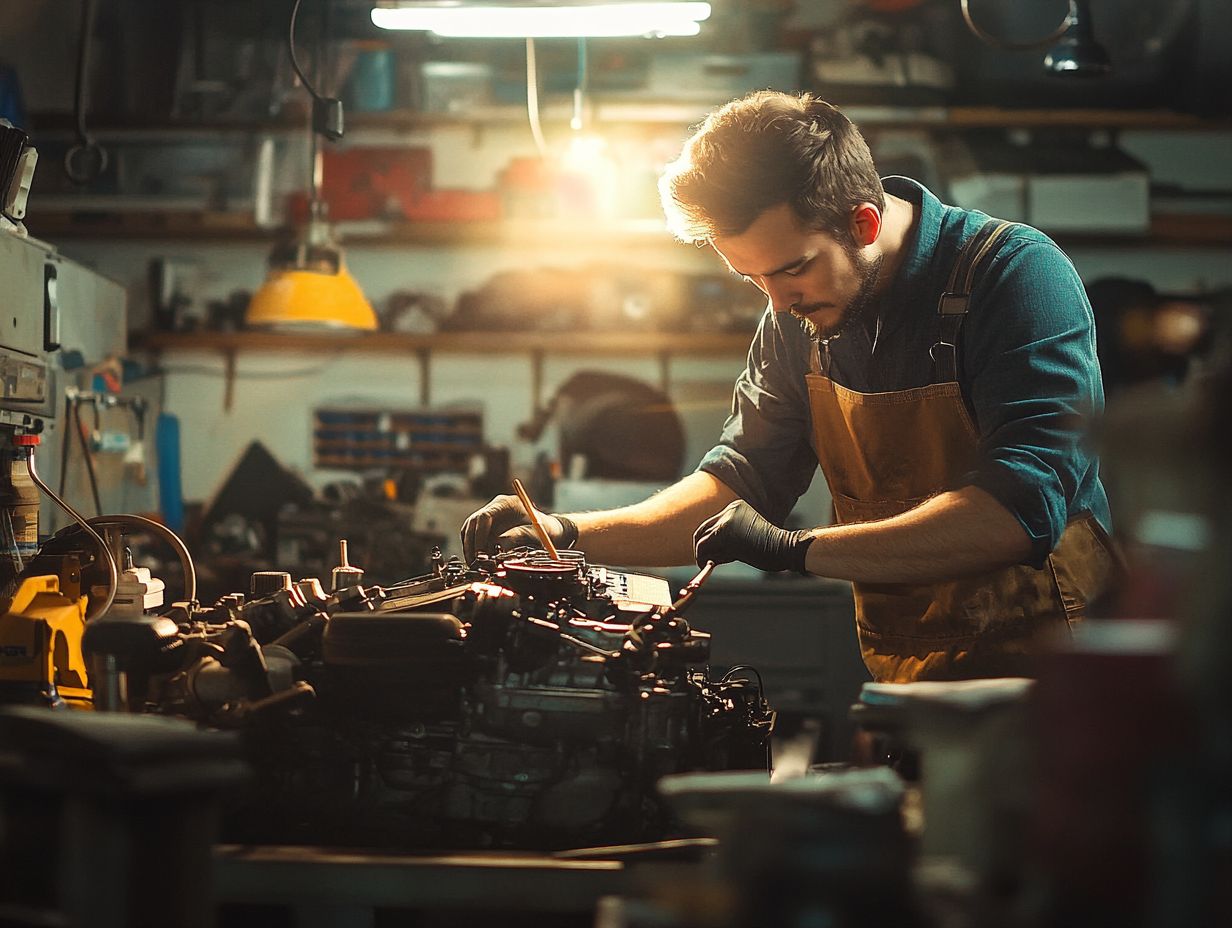
Common brake and suspension problems can reveal themselves in various ways. You may hear odd noises while driving or notice changes in your vehicle’s handling and ride quality.
You might be dealing with squeaking brakes, a sign that your brake pads are worn, or a soft brake pedal, which could indicate low brake fluid levels.
Suspension issues can manifest as excessive bouncing or a feeling of instability. These symptoms highlight the importance of timely brake and suspension repairs for your vehicle s safety and performance.
These issues can seriously impair your control over the vehicle, creating unsafe driving conditions. Regular maintenance checks are essential for these systems, and it’s important to prioritize checking fluid levels to keep your brakes functioning efficiently.
Don’t forget to monitor your tire pressure; improperly inflated tires can worsen suspension problems and negatively affect overall handling.
By being vigilant about these factors, you can help prevent more severe issues down the road, ensuring smoother rides and extending the lifespan of both your braking and suspension systems.
Electrical and Battery Repairs
Electrical and battery repairs are vital components of vehicle maintenance. They significantly influence your car’s performance and reliability.
A failing battery can cause a series of electrical problems, affecting everything from the ignition system to your lights and onboard electronics. This could leave you stranded when you least expect it.
To avoid unexpected breakdowns, prioritize regular vehicle inspections and timely battery replacements to keep your vehicle in top shape for safe driving.
Diagnosing and Fixing Electrical and Battery Issues
Diagnosing and fixing electrical and battery issues is crucial for maintaining your vehicle s reliability and performance. The systems are closely intertwined and essential for safe operation.
If you notice symptoms like dimming lights, failure to start, or malfunctioning electronic components, don t wait! Take action now!
A thorough diagnostic test can pinpoint specific issues, allowing certified car repair experts to recommend the right battery replacement or ignition system repairs to keep your vehicle roadworthy.
The diagnostic process usually starts with a visual inspection of wiring connections and terminals for any signs of corrosion or damage. Technicians often use tools like multimeters to assess voltage levels and battery health.
Once they identify the root of the problem, they can suggest effective solutions. This could mean replacing a worn battery, upgrading wiring, or repairing faulty connections.
Using high-quality auto parts during these replacements is essential. This practice not only enhances the longevity of the repair but also ensures your vehicle s electrical system operates reliably, minimizing the risk of future breakdowns.
Transmission Repairs
Transmission repairs are crucial for ensuring your vehicle runs smoothly. The transmission system is fundamental in transferring power and enhancing overall performance.
Look out for signs of transmission trouble, such as strange noises, slipping gears, or fluid leaks. These are clear indicators that it’s time to seek professional assistance.
By prioritizing regular maintenance, including checking fluid levels, you can prevent common issues and save yourself from expensive repairs in the future.
Don’t wait schedule a maintenance check today to keep your vehicle in optimal condition!
Signs of Transmission Problems and Solutions
Spotting transmission problems is key to keeping your vehicle running smoothly. You should remain vigilant for unusual noises, slipping gears, or any fluid spots under your vehicle, as these can signal serious transmission issues. Get professional help quickly to address these symptoms and prevent more extensive damage and costly repairs.
Monitoring your transmission fluid level is vital. Low or burned fluid can worsen existing issues. Regular checks and changes not only extend the life of your transmission but also enhance your overall driving safety.
When faced with potential transmission troubles, seeking assistance from technicians certified by the National Institute for Automotive Service Excellence is invaluable. These experts employ advanced diagnostic tools to accurately pinpoint problems, offering tailored repair strategies to restore your vehicle s peak performance efficiently.
By prioritizing these practices, you can significantly minimize the likelihood of severe transmission failures down the line.
Exhaust and Emissions Repairs
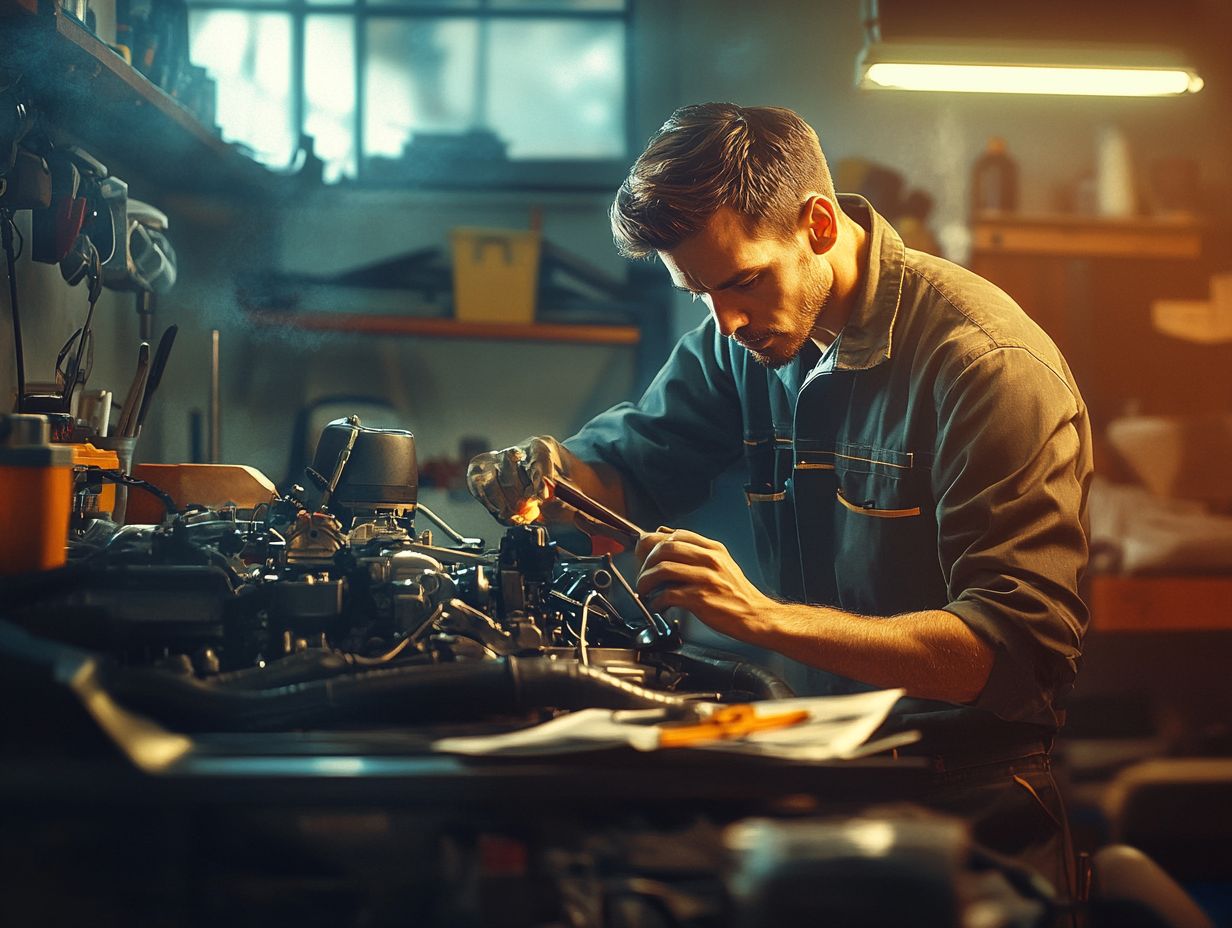
Exhaust and emissions repairs are essential for ensuring your vehicle operates efficiently and complies with environmental regulations. These systems play a crucial role in cutting down harmful emissions, contributing not only to air quality but also to your vehicle s overall performance.
A well-functioning exhaust system supports optimal fuel efficiency. Common issues can lead to increased emissions and diminished performance. By scheduling regular vehicle inspections, you can identify exhaust problems early on, enabling you to seek timely repair services and steer clear of potential regulatory fines.
Understanding Exhaust and Emissions Systems
Understanding exhaust and emissions systems is essential for you as a vehicle owner, given the significant impact these components have on both performance and the environment. The exhaust system is designed to channel harmful gases away from the engine and reduce emissions. Regular vehicle inspections can reveal issues that may lead to excessive emissions. This not only ensures compliance with environmental regulations but also keeps your vehicle functioning at its best.
Exhaust and emissions systems include key elements like catalytic converters, mufflers, and oxygen sensors that work together to minimize pollutants. These components transform toxic gases into less harmful substances before they exit your vehicle, thereby protecting the environment and public health. Conducting diagnostic tests regularly is crucial for spotting issues such as sensor malfunctions or leaks that could compromise performance and elevate emissions levels.
Promptly addressing these repairs is vital; neglecting them can lead to more severe mechanical problems and ultimately result in costly repairs. Being proactive about your exhaust and emissions systems is crucial for maintaining your vehicle’s integrity and supporting a healthier planet.
Preventive Maintenance Tips
Ready to give your car a longer life? Preventive maintenance tips are invaluable for any car owner seeking to enhance their vehicle’s longevity and performance while sidestepping expensive repairs. By establishing a consistent maintenance routine and following the owner’s manual, you can tackle potential issues before they escalate into serious problems.
Key practices such as regular oil changes, monitoring fluid levels, and inspecting tires are essential in preventing common auto repair needs. Additionally, you can learn about DIY car repairs to ensure your vehicle remains in optimal condition.
Start today to keep your vehicle in top shape!
How to Avoid Costly Repairs
Avoiding costly repairs requires your diligence and a proactive approach to taking care of your car. Making preventive care an essential aspect of car ownership is crucial. By adopting a consistent maintenance routine, you can detect and address vehicle problems before they escalate into significant issues. For more insights, check out the most common car repairs.
Regularly scheduled inspections and timely repair services are vital in preventing common auto repair scenarios. This ultimately saves you money and ensures the safety and reliability of your vehicle.
This means not just scheduling oil changes and tire rotations. Be attentive to any unusual sounds or warning lights that might signal underlying problems.
Investing in quality auto parts during repairs can significantly enhance longevity and performance. This reduces the chances of repeated failures.
Maintaining open communication with a trusted mechanic can provide valuable insights into potential future issues, enabling you to take proactive measures. By prioritizing these strategies, you can protect your investment, enjoy smoother rides, and avoid the stress and expenses associated with major repairs.
Frequently Asked Questions
Curious about common car repairs? Here are a few!
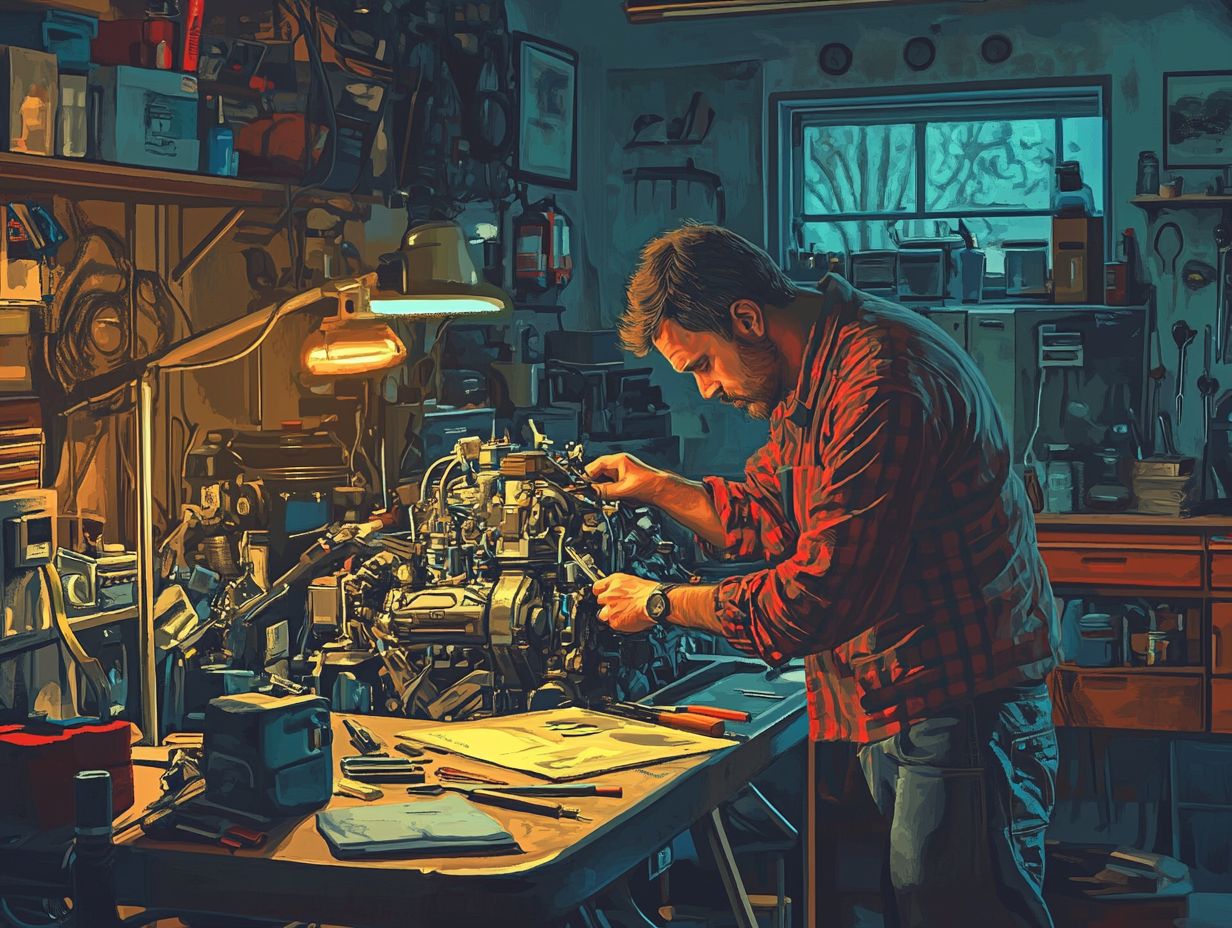
Some common car repairs include replacing brake pads, changing the oil, fixing a flat tire, and replacing a dead battery. Knowing the top 10 most common car repairs you should know can also help you identify other repairs, such as replacing spark plugs, which ignite the fuel in your engine, changing air filters, and fixing electrical issues.
What is the purpose of a comprehensive car repair guide?
A comprehensive car repair guide provides detailed information on various car repairs. For those looking to enhance their knowledge, essential car maintenance includes step-by-step instructions, necessary tools, and safety precautions. It helps car owners save time and money by performing minor repairs themselves.
Do I need to have any prior knowledge to use a comprehensive car repair guide?
No, a good comprehensive car repair guide should be simple to understand and easy to follow. This is true even for those with little to no prior knowledge about cars. It should include illustrations and clear explanations, as well as insights into the cost of common car repairs to make the repair process less intimidating.
How can I prevent common car repairs?
Regular maintenance is key to preventing common repairs for sports cars. This includes getting your car serviced regularly, checking tire pressure and tread, and changing the oil and air filters. Don’t wait! Address warning signs immediately to prevent bigger problems.
When should I seek professional help for car repairs?
If you are not confident in your abilities, or if the repair is complex, it’s best to seek professional help. Repairs that require specialized tools or equipment should also be handled by a professional. If you’re unsure about a repair, get professional help right away to avoid potential dangers.
Are there any safety precautions I should take when performing car repairs?
Yes, it’s important to follow all safety precautions listed in your comprehensive car repair guide. This may include wearing protective gear, using jack stands to support the car, and disconnecting the battery before working on electrical components. Additionally, knowing how to stay prepared for common car repairs can help you feel more confident. If you are unsure about a repair, it’s always best to seek professional help.


